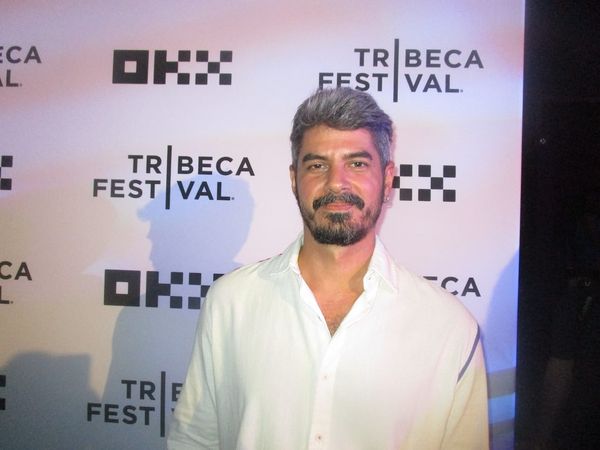At the Tribeca Festival Awards ceremony at Racket, Artistic Director Frédéric Boyer announced the winners of the International Narrative Competition Feature Awards (selected by jury members Zazie Beetz, Brendan Fraser, Alfredo Jaar, Shirin Neshat, and Kate Siegel). Best Cinematography went to Linga Acácio for Guto Parente’s A Strange Path (Estranho Caminho, Brazil); Screenplay to Guto Parente for A Strange Path; Performance to Carlos Francisco for A Strange Path, and for a Tribeca record of four honours, the Best Film went to A Strange Path, produced by Ticiana Augusto Lima, and starring Lucas Limeira and Carlos Francisco with Tarzia Firmino, Rita Cabaço, Renan Capivara, and Ana Marlene.
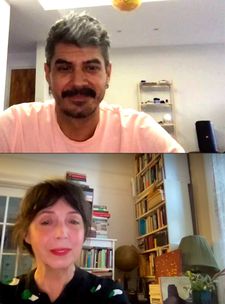 |
| Guto Parente with Anne-Katrin Titze: “I love Kafka literature, so there’s a lot of influence.” |
David (Lucas Limeira), a young filmmaker, returns from Portugal to his native Brazil to present his first feature at a festival in Fortaleza, the northeastern city where he grew up. It is spring of 2020 and the first news of hospitalisations, even deaths are reported on the news. When his screening is postponed, the rather shabby inn where the festival put him up closes down, his phone is stolen on the beach, and old friends are a let-down, contacting his estranged father (Carlos Francisco) seems to be the only option for David.
Could the man pushing a door in a shopping cart through the nightly streets have been his father? Ringing the bell at the run-down but beautiful building will provide some long-yearned-for answers. Memory, dreams, very specific quotidian pandemic concerns, and cinema intersect in this unique take on big metaphysical questions.
From Fortaleza, Brazil, Guto Parente joined me on Zoom for an in-depth conversation on A Strange Path.
Anne-Katrin Titze: Hi, good to see you again! How is the car [Guto had emailed me earlier about car troubles which had us postpone the conversation for an hour]
Guto Parente: Well, it’s broken. I have to wait until Monday to fix it. Problem in the radiator or something. I understand nothing about cars.
AKT: Where are you?
GP: I’m in Fortaleza, it’s the city I’m based in Brazil.
AKT: I was just wondering because there are four time zones in Brazil which one you are in.
GP: Yeah, here we are one hour ahead of you.
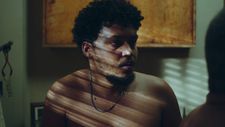 |
| Guto Parente on David (Lucas Limeira): “We live in a very hot city, Fortaleza is always very hot.” |
AKT: Once again congratulations on your enormous success in Tribeca! Have you calmed down from all this excitement?
GP: Not yet! I’m still processing all the things that went through. It’s amazing.
AKT: You dedicated the film to your father and to “all our dead.” How much is there that’s autobiographical and how much is it to all our dead?
GP: First it’s a movie that since the beginning I wanted to do for my father. He passed away on the same date that is in the movie, in December 2017. When I was writing the script which happened in April 2020, I was writing a narrative that was going on at the same time. It’s the beginning of the pandemic in Brazil and I had lost my dad three years ago. I wanted to make this movie for him and it’s also a movie for cinema itself. The love for cinema which I have, I learned from him.
He was a great cinephile. So it’s a movie dedicated to him and our relationship. Also the movie is set during the pandemic. I lost other people that I loved during the pandemic. Well, we all lost someone, all know someone who lost someone. So I thought it would be important to remember all the dead, not only my father.
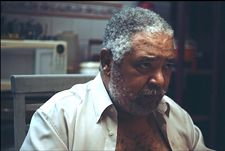 |
| Carlos Francisco as David’s estranged father Geraldo in A Strange Path won Best Actor |
AKT: It’s powerful, to all our dead. Because it also, as you say, does connect to cinema, because we see the return of the dead in cinema. At the same time this is what happens in dreams. Everybody knows dreams where the dead come back and we encounter them. The language of cinema and the language of dreams are connected. Your film speaks of it.
GP: I totally agree with that. Film is a dream language. It’s where we can get through this border between what we call reality and fantasy. Through our dreams I truly believe we can communicate with other dimensions. I’ve had very strong dreams with my father after he died and also with friends that I lost. When you wake up and remember, it’s so real and there’s always some kind of message, some kind of learning. And a film itself can be that.
AKT: What I found so amazing about your film is that although we all just went through the COVID time, at the beginning of your film it still feels so strangely futuristic. Science fiction, despite the fact that many of the things you show are really our very recent past. There’s something miraculous you accomplished there. I don’t know if you can tell me how you did that!
GP: I don’t know if I can specify, but it’s just when I am writing, when we are creating there are so many mysterious things going on. Also the fact that the film has been written during this time. I was living the isolation and loneliness of COVID, living alone in my apartment. I read my father’s book once again. The book that we have in the movie was actually written by him. I think I felt a need to reconnect with him somehow and this was a very specific moment in which we were so close to death.
 |
| Guto Parente: “Film is a dream language. It’s where we can get through this border between what we call reality and fantasy.” |
Death was all around. I mean Brazil, it’s a violent country in many aspects but we’ve never been in a war, only the internal war which happens every day. But this idea of being so close to death, I think it opens up some perceptions and some kind of sensibility. And there’s some magic that goes with it. I truly believe that when we are open to the mysteries of life and want to be touched by things that come from other dimensions, it will come through. So for me this movie has a lot to do with that.
AKT: I’m curious, as this is your father's book: Being greeted by your spouse with fruit juice and then getting a foot massage, and having a bath prepared! That was really his suggestion, or did you invent that?
GP: Yes, it was his suggestion! If you talk with my mother, maybe she would say that that wasn’t what was really happening.
AKT: It’s funny. Certain elements in your film felt very real but at the same time very Kafkaesque. Did Kafka come to your mind? I’m thinking of the social distancing when he is already the only one at the inn. Or the wonderful police scene when he had his phone stolen. So was Kafka on your mind?
GP: Yeah, for sure. There’s a Kafka book called Letter to …
AKT: … his Father!
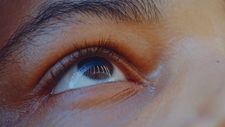 |
| Guto Parente: “I truly believe that when we are open to the mysteries of life and want to be touched by things that come from other dimensions, it will come through.” |
GP: His father! Which is a very strong book. I remember reading it when I was a teenager, feeling really rebellious. Everybody has daddy issues, of course. But this book marked me a lot, for sure. I love Kafka literature, so there’s a lot of influence.
AKT: Kafka situations seem to occur more and more. This week I had an interaction at a sample sale. Here in New York there are no taxes on clothing under $110. I was buying two pieces at the designer’s studio in the Garment District, which were less, two blouses for $60 each, and the person helping out said: “Oh no, we don’t do that, we just add the tax anyway for everything.” I kept trying to explain that this is illegal and she could look it up. She said “No, this is how it is in our system. We have it all programmed.” You just give up!
GP: It’s funny that you mention that, because when I was in the airport coming back, I had a problem with my credit card and I wanted to buy a slice of pizza and I wanted to pay in cash. Like $7 something. I went to the guy to buy the pizza and pay in cash and he pointed me to this old lady who was kind of far away and said “You have to pay with her.” I said okay, and went there and talked with her and she said “Okay, we need to register and get a code so you can give the money.”
She said “Follow me” and then we walked really far from the pizza place to go to this little screen where I had to get the QR code from the screen to get a code that she would enter and then I would put the money in a machine and it wasn’t working out. I was like, wow, this is so crazy, I have the money in my hand, I just want the pizza. And she said “Yes, yes.” It was so hard! And I thought about Kafka. I thought, man, this is like science fiction. I just want to get a slice of pizza with money and I can’t.
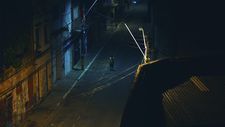 |
| Guto Parente: “At night it’s really deserted and kind of dangerous.” |
AKT: Put it in your next movie! That pizza has to be in there. It’s incredible and so so true.
GP: It was so hard! It took like 40 minutes! She tried, then asked another guy and he came over. And I said “I want to give up.” And they said “No, don’t give up!”
AKT: Was it at least good, the pizza?
GP: It was fine. I had better ones, but in the airport you’re hungry.
AKT: In your film when David arrives at the door for the first time to see his father, he has the shirt on over his head as if the shirt were a necklace in a strange state of dress/undress. It’s a really interesting choice for that scene.
GP: We live in a very hot city, Fortaleza is always very hot. So we are always naked at home, I mean, at least without shirts or T-shirts. Sometimes you expect someone and you dress. He kind of came half the way. He just put it over his head and that’s enough. That was a very interesting suggestion from our costume designer, Thaís de Campos, who is a great artist and a great costume designer. And I found it wonderful.
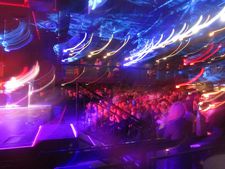 |
| Tribeca Festival Awards Night at Racket Photo: Anne-Katrin Titze |
AKT: It works beautifully and it’s also the first time we hear your protagonist’s name. François Truffaut, because he started out as a critic and knew what it means to write things down while watching a film, said that always within the first minutes give everyone a name who is important. Not so here. It’s like a gift the father gives us when he calls him David. Also in this scene the father leaves him standing outside. There are a lot of folktales that speak of how the devil cannot enter your house unless you invite him in. But no - here it’s all about the fumigator.
GP: I think that moment represents all the things that we went through during the beginning of the pandemic. I remember going to the supermarket to buy stuff and then washing all the boxes. Then some months later there was a scientific article saying that it doesn’t matter because it goes through the air. The father decided to clean up the COVID threat like that, like a ritual of entrance. That kind of nonsense.
AKT: Again, it feels futuristic and absurd and very real. The building where the father lives has such a big presence. From the outside you can see how beautiful that building was once upon a time. Now it’s falling to pieces. I was thinking about another Brazilian film where a house is so prominent, Kleber’s [Mendonça Filho] Aquarius. You must know it?
GP: Yes, of course. That building in our film is in the city downtown. It’s not a very residential area. It’s more for commerce and not many people live there. At night it’s really deserted and kind of dangerous. Our production designer, Taís Augusto, she is also an architect and she studied a lot of those buildings in downtown.
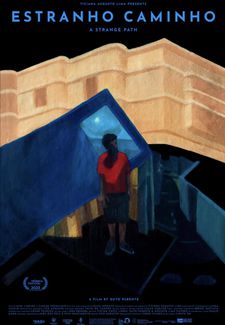 |
| Estranho Caminho (A Strange Path) poster |
AKT: She was in Tribeca, right?
GP: Yes, she was there, you met her! She knew some buildings which she thought were beautiful and interesting. So she showed us this building and I loved it. The inside we created in another place. All the interiors we built in a house far away from downtown. It was a kind of studio thing, so the apartment’s inside is not the same as the façade.
AKT: The other person who came to Tribeca whom I met was the sound designer?
GP: Yes.
AKT: He did a tremendous job right from the very start. It’s ominous, and disorienting and also intriguing.
GP: Lucas [Coelho] is a great partner; we’ve been working together for a long time. We had many months working on the sound and creating all the atmospheres that give density to the scenes. He’s amazing. I mean, that’s the thing, when you have a great crew and partners where everyone is real talented. Most of the people who worked on the movie are also filmmakers, are also artists.
Like our cinematographer Linga Acácio she is a DP but she’s also a visual artist. She is now in Paris at the Tokyo Palais presenting her work. She also makes movies. Ticiana [Augusto Lima], who is the producer, she also makes movies of her own, so does Taís. It’s great to work with people who are not only technicians, who have the technical knowhow, but also have the sensibility of being an artist or a filmmaker. We are like a cinema family here and have been making cinema for many years together.
AKT: It adds up to have all this creativity! Are you working on a new project?
GP: Yeah, I have a project to shoot at the beginning of next year. I’m still working on the screenplay.
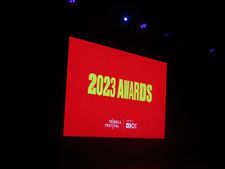 |
| 2023 Tribeca Festival Awards at Racket Photo: Anne-Katrin Titze |
AKT: Topic-wise, do you want to share anything?
GP: It’s a movie about a film set where everything goes wrong. There’s some mysteries going on. It’s more like a comedy about filmmaking and how hard it is to do cinema here.
AKT: Earlier today, I emailed a friend, Shirin Neshat, who was on the jury for your category at Tribeca and told her I was going to speak with you.
GP: Oh please tell her how grateful I am for those prizes. I would love to meet her someday. I think she’s a great artist and I feel very proud to receive four awards that came from her.
AKT: Yes, four, that’s amazing! I hope your car will be fixed on Monday! Send my greetings to all of your team whom I met in New York!
GP: Thank you very much! It was really nice meeting you and having this conversation right now!








